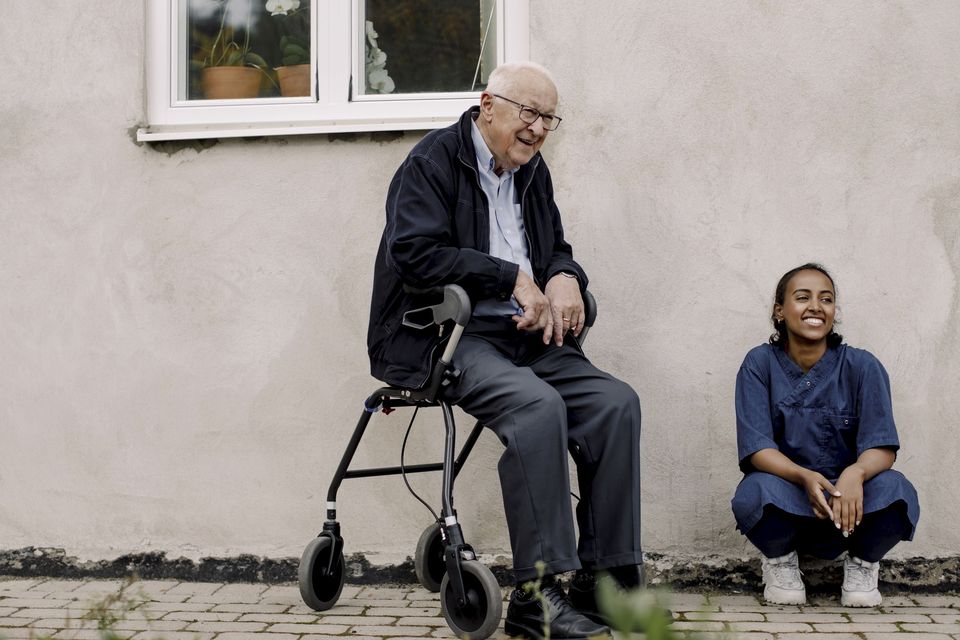
As talk of forming a new government dominates print and the airwaves, I’m struck by the language being thrown around by politicians when it comes to me and thousands more disabled people. It’s careless, objectifying, and insulting. A statement such as “there’s a lot to be done in disability” is empty and offensive.
It perpetuates tired stereotypes, propping up a system that normalises segregation and discrimination. The word “disability” is tossed about with alarming regularity, but where is the word “person”? Where’s the acknowledgement that we are real people – constituents, students, taxpayers, parents, homeowners, in need of a home, athletes, artists, members of society? Then there’s the “disabled people and their carers”, which cropped up during the election campaign and was parroted in the media. Let’s get one thing straight: staff who work in services are not our carers; they are employees doing a professional job.

Disabled people aren’t all in “care relationships”. Most of us need support, yes, but many of us also provide care to others. This lazy lumping together does nothing but erase our rights and diminish our lives.
The Carer’s Allowance is another thorn in this debate. Politicians are quick to talk about removing means-testing, but nothing has changed. Families still face obstacles and invasion, handing over intimate medical and financial details to access what is often a desperately needed lifeline.
It’s degrading and needs fixing now, not over the “life-time of the government”. As a disabled person, I rely on personal assistants so I might live my life. They work for me, following my direction.
They’re not my carers. Conflating these roles strips disabled people of our agency. It needs to stop.
This isn’t about being pedantic – language matters. It reflects deep-rooted ableism. For over a century, it has shaped how people see us and how policies treat us and it needs to end.
It’s time to start recognising us as individuals with rights, aspirations and contributions. Ann Marie Flanagan, Ennistymon, Co Clare Economic boom times won’t always with be us, so we need to be prudent On the face of it, Ireland’s economy is booming. A visitor to Dublin was telling me recently that people are still driving unbelievably massive tanks of cars around the city.
He astutely observed that if you phone a restaurant, it is hard to get a reservation. He also found it fascinating to discover that the biggest problem Dublin Airport has is car parking, because so many Irish people are going on holiday or otherwise leaving the country. It’s my assertion that people know deep down in their hearts that this economic high cannot last.
They are aware there are external threats and uncertainty everywhere. This is a call to our new administration to be ready when these external threats start to become a reality. John O’Brien, Clonmel, Co Tipperary Rumours of left’s demise have been exaggerated for readers’ attention Senan Molony clearly does not like Sinn Féin.
We get that (‘Sinn Féin’s slipping mask shows why there may be no left alternative at next election’, Irish Independent , December 9). In the televised debate between the three party leaders at the end of last month, your columnist stood alone and hailed Simon Harris as being the winner, giving him eight out of 10 marks (‘Squabbling, sniping and pointed asides from Micheál Martin, Mary Lou McDonald and Simon Harris – who won the RTÉ leaders’ debate?’, Independent.ie, November 26 ).
The contrast between political opinion writers is often laid bare in our free and independent press, but saying “there may be no left alternative at the next election” really takes the biscuit. Tom McElligott, Listowel, Co Kerry Neutrality is so precious it should be guaranteed under constitutional law Thursday is the UN international day of neutrality. Article 29 of the Constitution obliges the Government to be guided by the ideal of peace and friendly co-operation among nations founded on international justice and morality and to adhere to the principle of the pacific settlement of international disputes by international arbitration or judicial determination; and that Ireland accepts the generally recognised principles of international law as its rule of conduct in its relations with other states.
This is reflected in article two of the UN Charter, which obliges member states to settle their international disputes by peaceful means and to refrain from the threat or the use of force in their relations with other states. Active Irish neutrality is supported by the vast majority of the Irish people. In recent decades, successive Irish governments have been eroding our neutrality by allowing the US military to transit through Shannon Airport and Irish airspace while waging wars against Serbia, Afghanistan, Iraq and elsewhere.
This has continued since October 7 last year, while the US has been actively supporting the state of Israel. Irish neutrality is a matter of government policy, which can be ended by a vote in Dáil Éireann. Neutrality needs to be enshrined in the Constitution as a sovereign decision by the Irish people.
Edward Horgan, Castletroy, Limerick Charging people to cast their vote is an idea we could borrow from TV There appeared to be huge disappointment over the past week or so about residents of this country not being allowed to vote on the reality show I’m a Celebrity...
Get Me Out of Here . Had Irish residents been allowed to vote, they would of course have been charged a fee. Around the same time, a general election was held in Ireland, with two-fifths of the electorate choosing not to vote.
Now, the participants in the I’m a Celebrity...
jungle might be more recognisable than protagonists in a general election, to quite a few here, and of course the counting taking place over an advertisement break rather than over a few days is way more appealing, no doubt. But in an effort for more voter participation in our elections, are we missing a trick by not charging them to vote? Noel Walsh, Glasnevin, Dublin 11.










